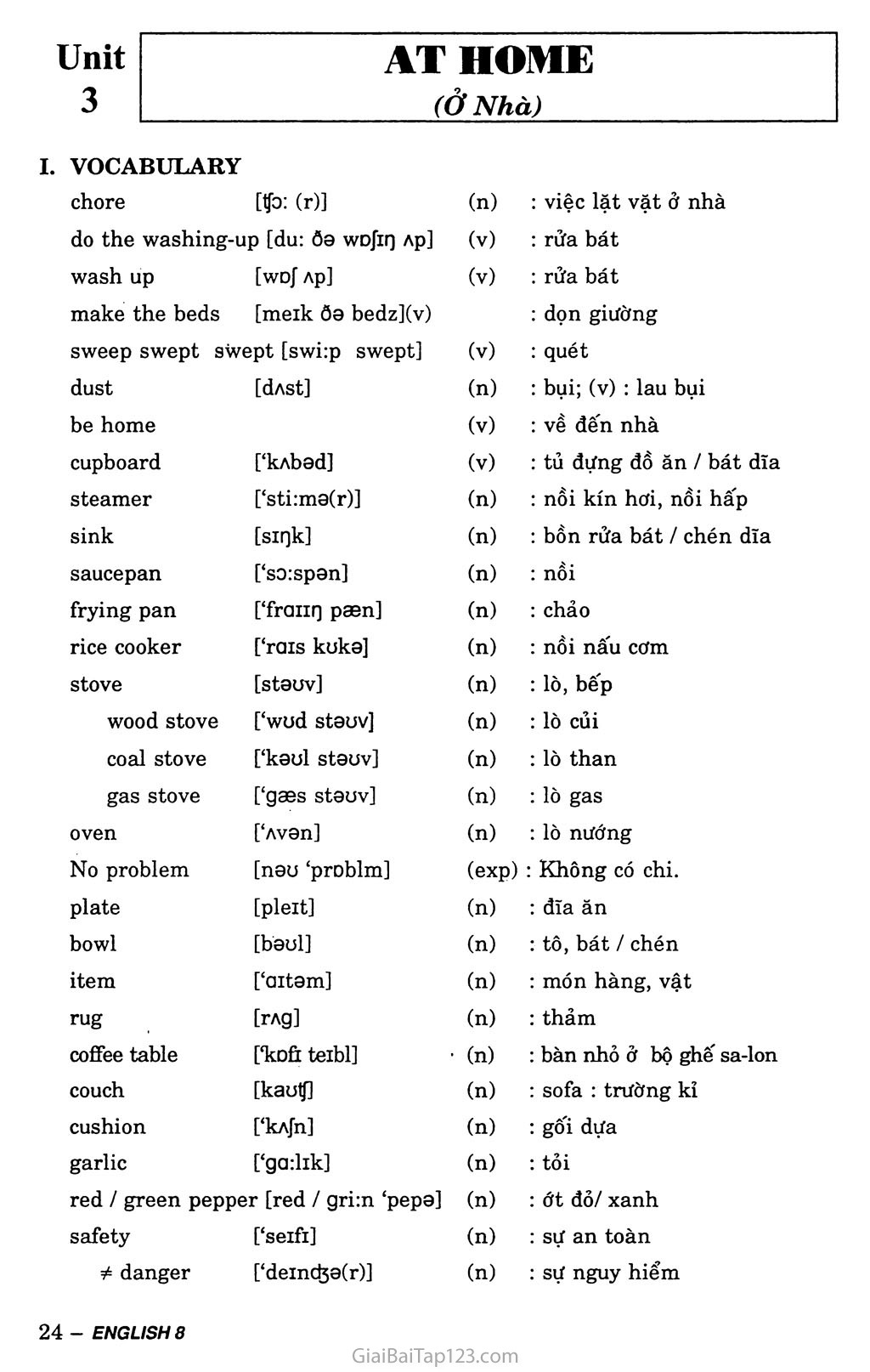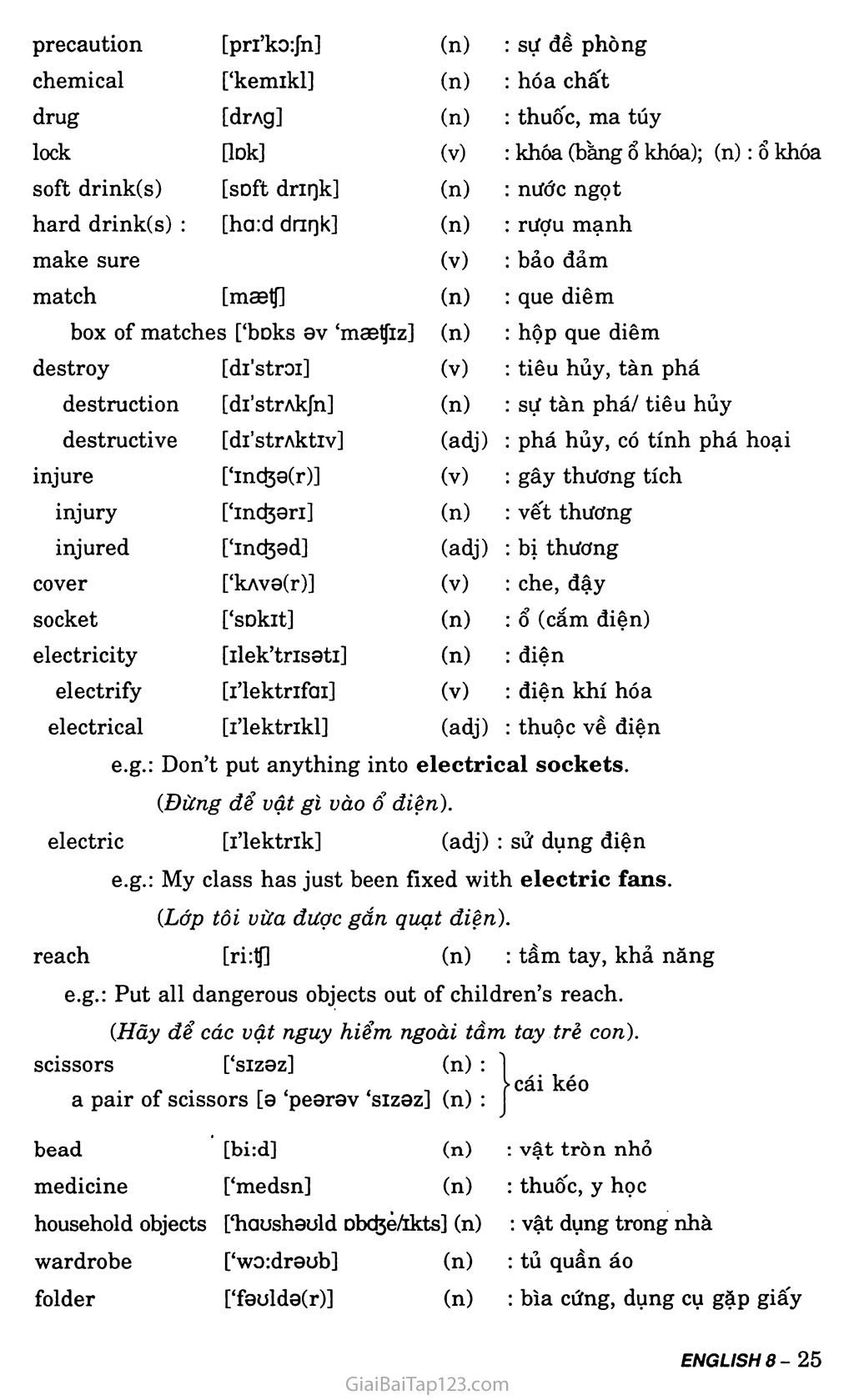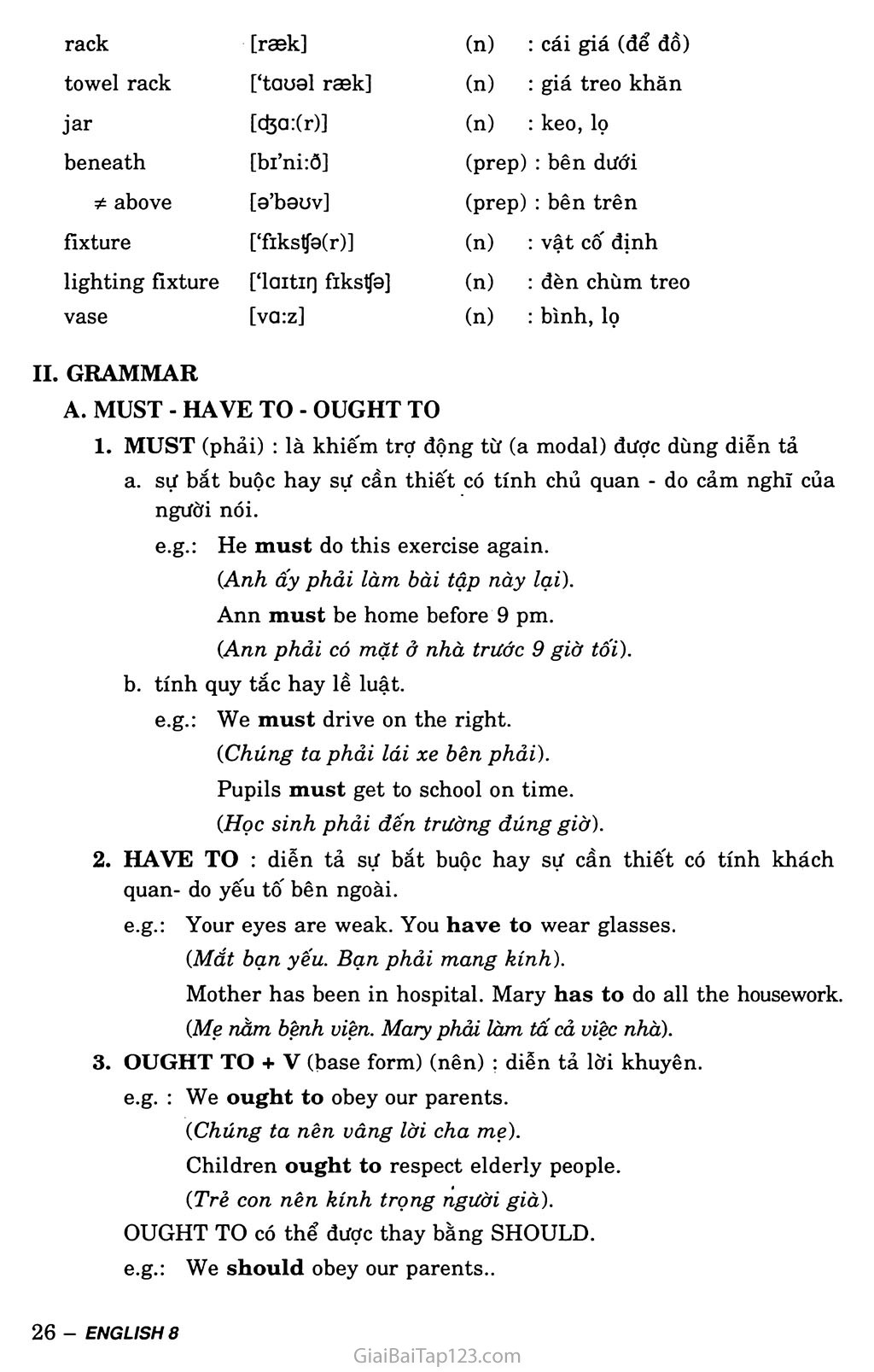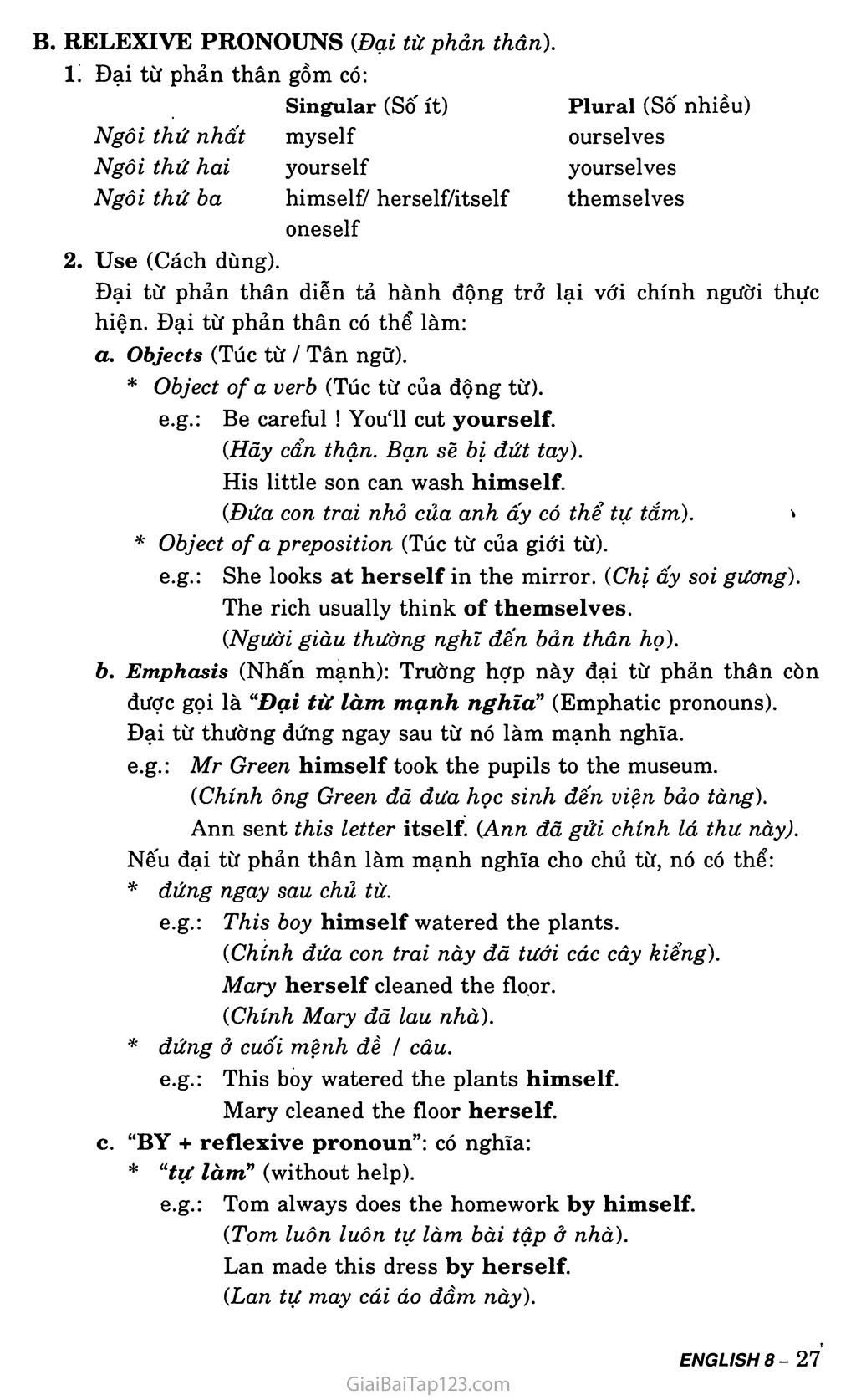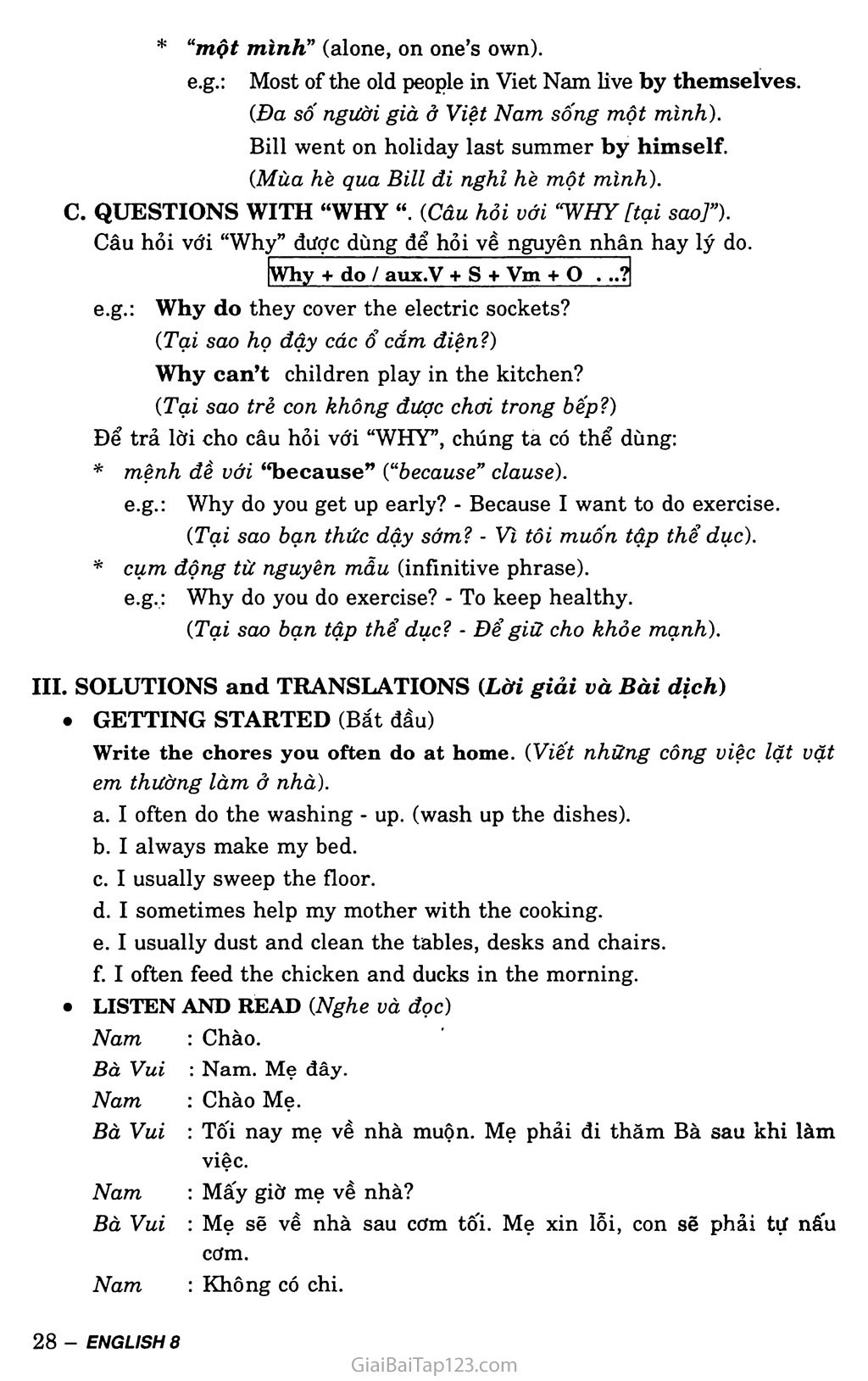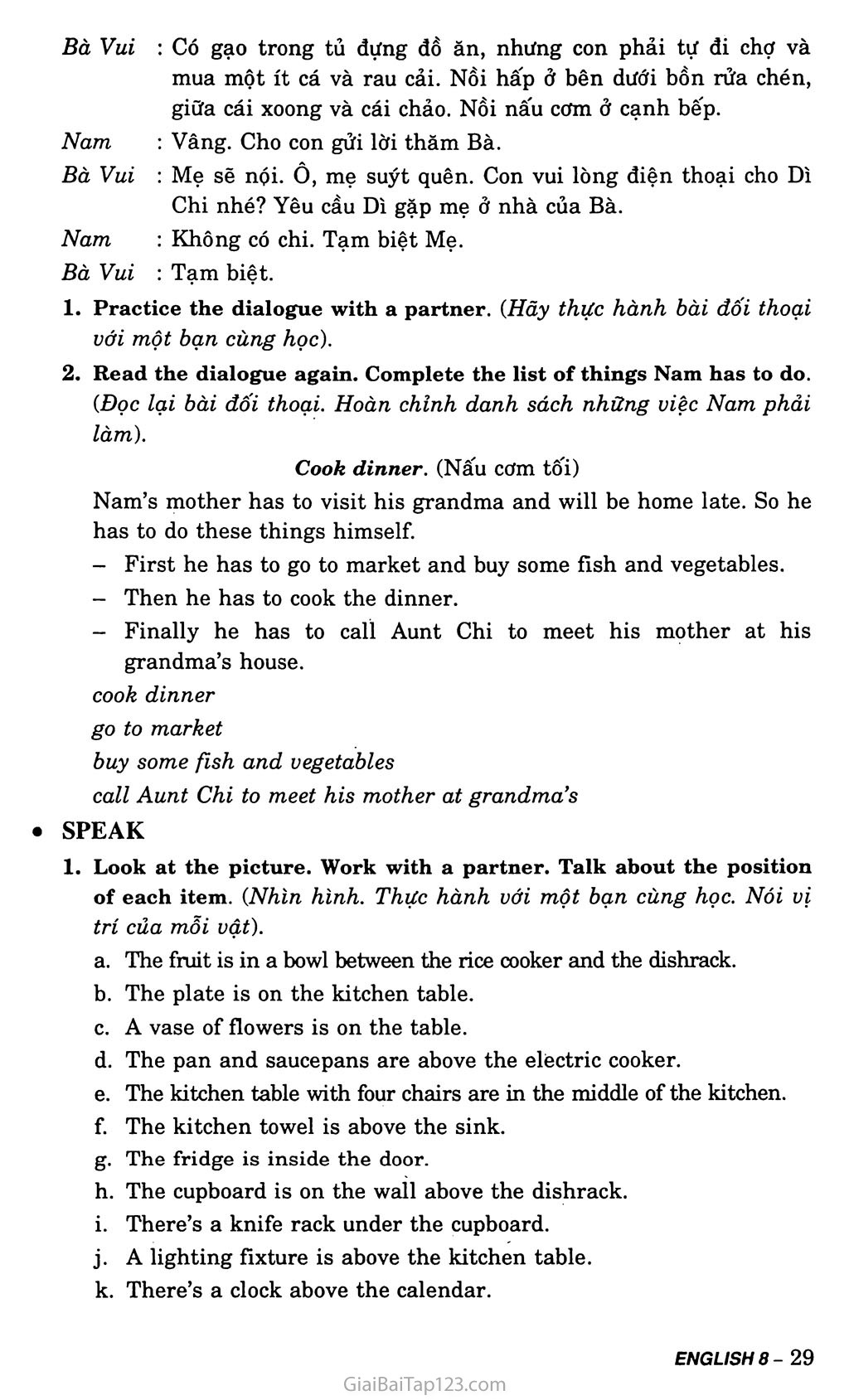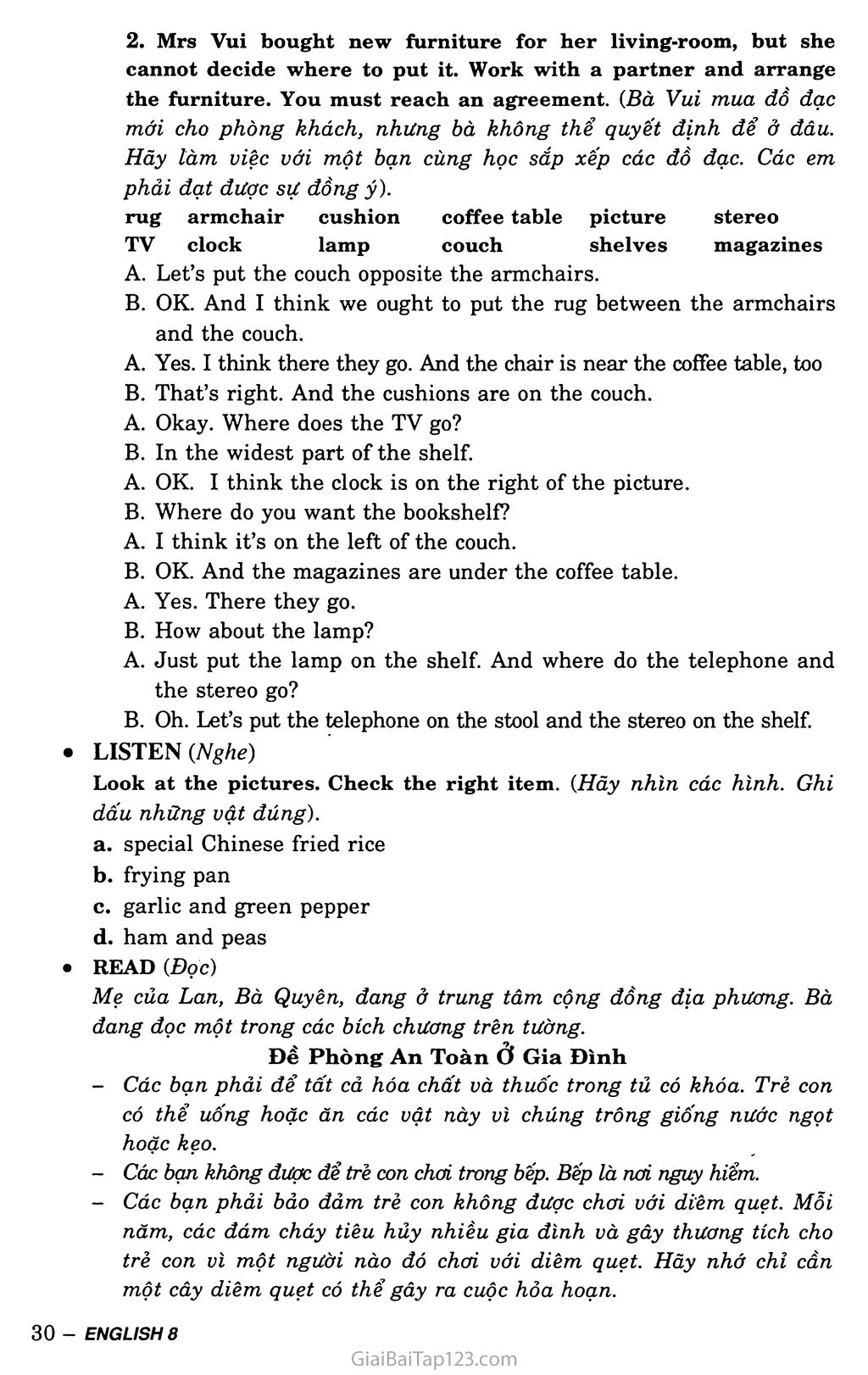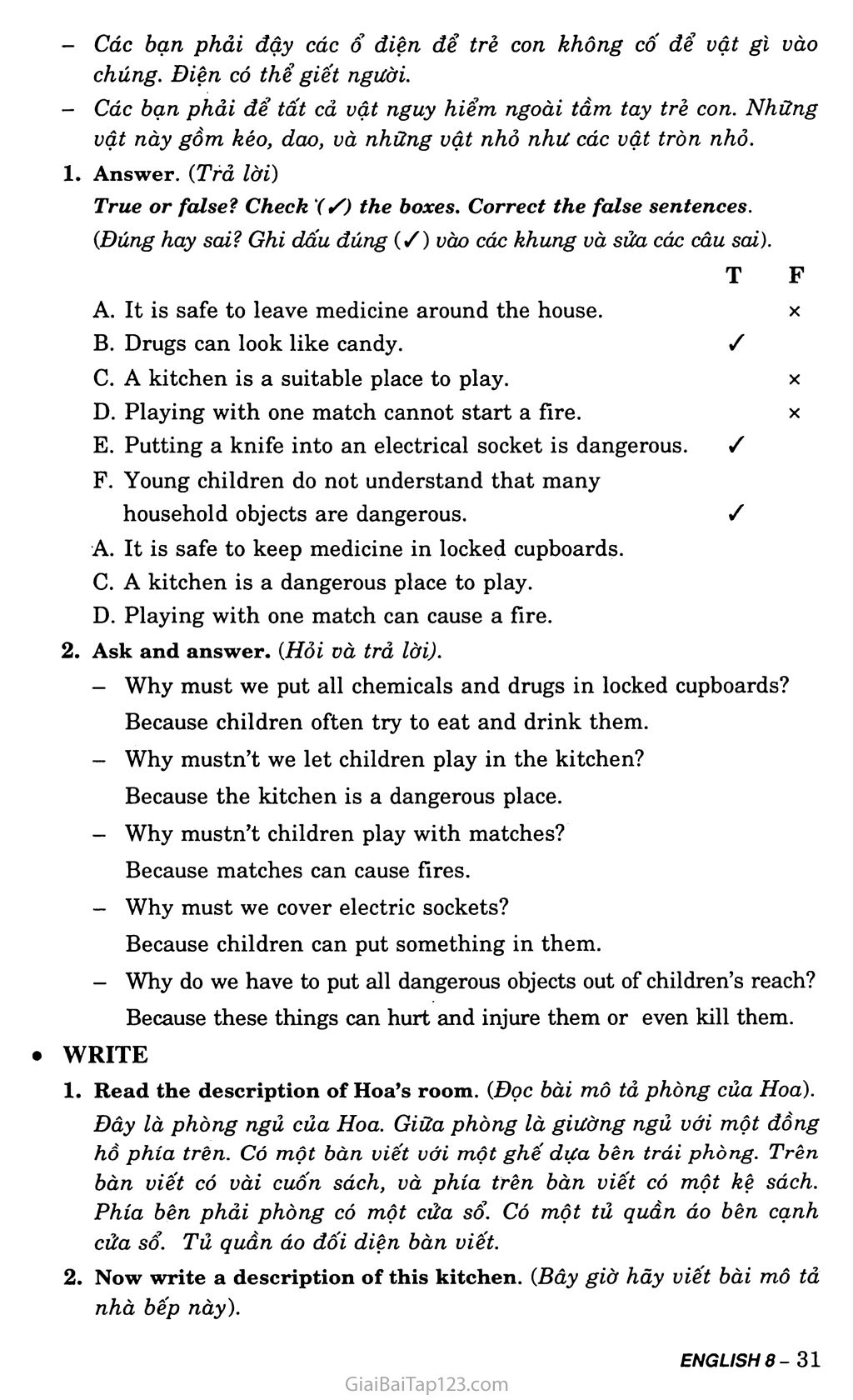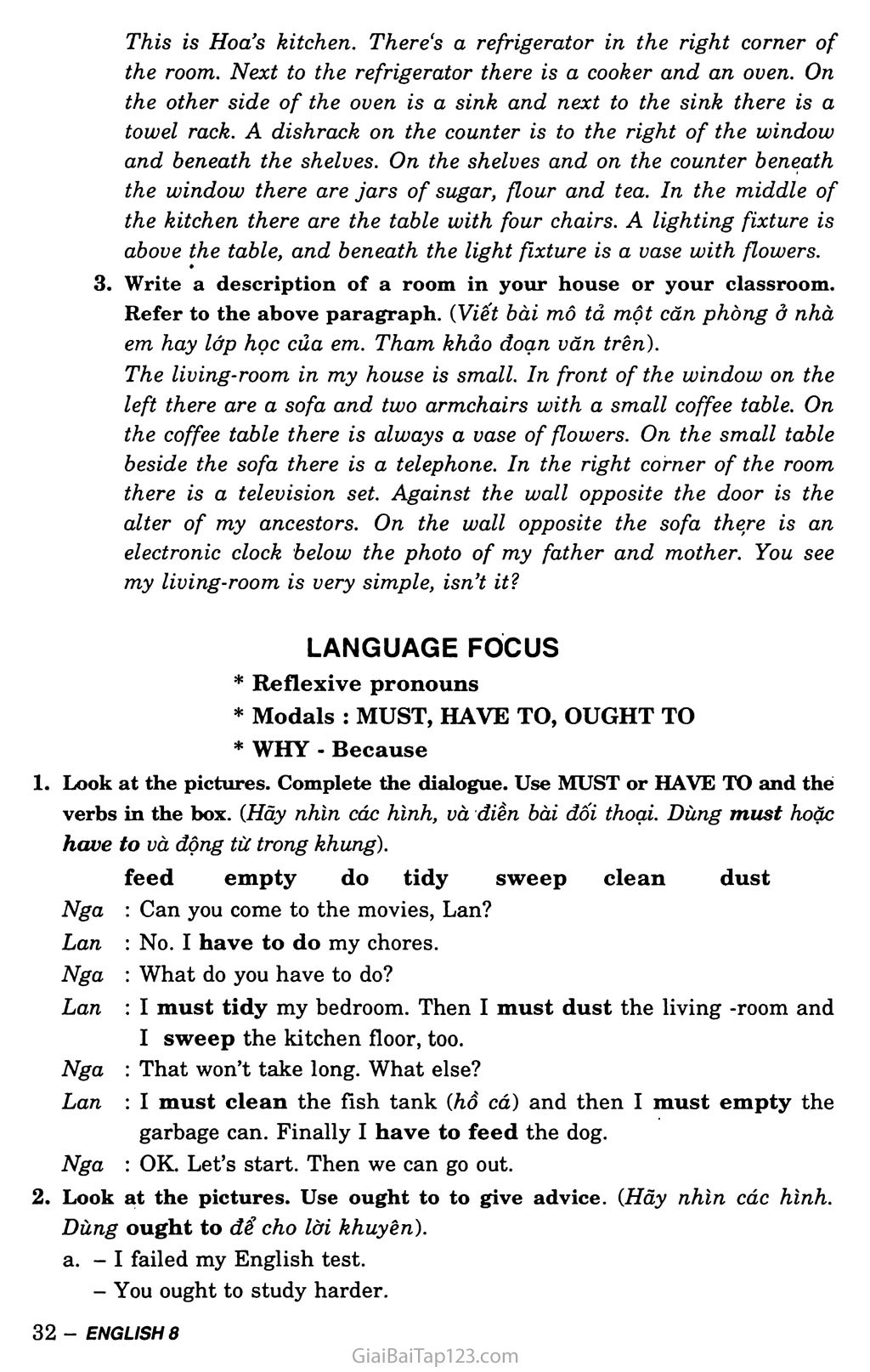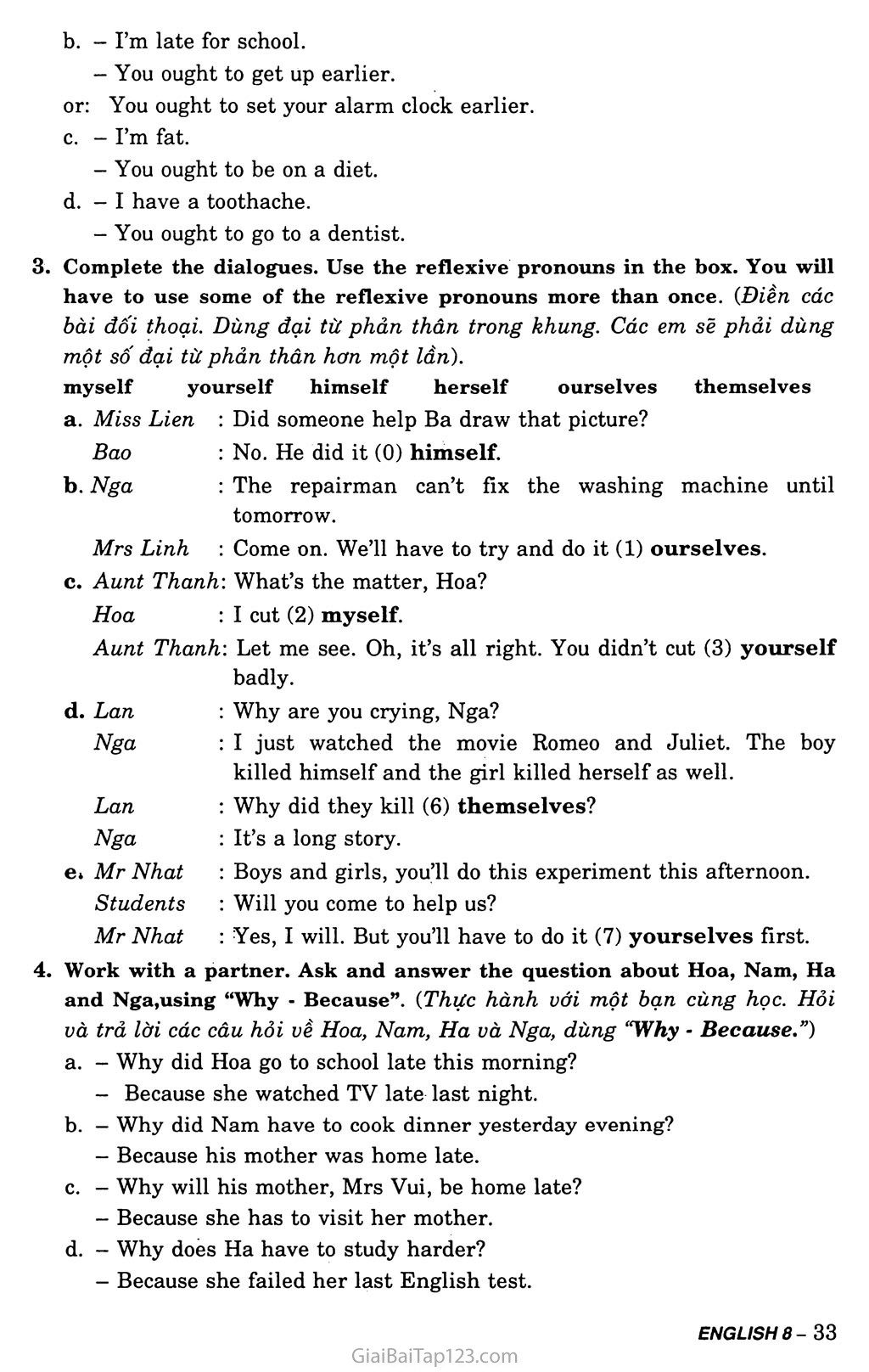Giải tiếng Anh lớp 8 Unit 3: At Home
Unit
3
AT HOME
(Ở Nhà)
I. VOCABULARY
chore
[ựo: (r)]
(n) : việc lặt vặt ở nhà
do the washing-up [du: ỗa wdJiq Ap]
(v) : rửa bát
wash up
[wdJ Ap]
(v) : rửa bát
make the beds
[meik Õ9 bedz](v)
: dọn giường
sweep swept swept [swi:p swept]
(v) : quét
dust
[dAst]
(n) : bụi; (v) : lau bụi
be home
(v) : về đến nhà
cupboard
[‘kAb9d]
(v) : tủ đựng đồ ăn / bát dĩa
steamer
[‘sti:ma(r)]
(n) : nồi kín hơi, nồi hấp
sink
[sink]
(n) : bồn rửa bát / chén dĩa
saucepan
[‘so:sp9n]
(n) : nồi
frying pan
[‘frann psen]
(n) : chảo
rice cooker
[‘rais kuka]
(n) : nồi nấu cơm
stove
[stauv]
(n) : lò, bếp
wood stove
[‘wud stauv]
(n) : lò củi
coal stove
[‘k9Ul stauv]
(n) : lò than
gas stove
[‘gaes stauv]
(n) : lò gas
oven
[‘Avan]
(n) : lò nướng
No problem
[nau ‘prDblm]
(exp) : Không có chi.
plate
[pleit]
(n) : đĩa ăn
bowl
[haul]
(n) : tô, bát / chén
item
[‘aitam]
(n) : món hàng, vật
rug
[rAg]
(n) : thảm
coffee table
[TíDữ teibl]
(n) : bàn nhỏ ở bộ ghế sa-lon
couch
[kautj]
(n) : sofa : trường kỉ
cushion
[‘kAjn]
(n) : gối dựa
garlic
[‘ga:lik]
(n) : tỏi
red / green pepper [red / gri:n ‘peps]
(n) : ớt đỏ/ xanh
safety
[‘seifi]
(n) : sự an toàn
5Ể danger
[‘demd39(r)]
(n) : sự nguy hiểm
precaution
[pri’ko:Jh]
(n)
sự đề phòng
chemical
[kemikl]
(n)
hóa chất
drug
[drAg]
(n)
thuôc, ma túy
lock
[lDk]
(v)
khóa (bằng ổ khóa); (n): ổ khóa
soft drink(s)
[sDft driqk]
(n)
nước ngọt
hard drink(s) :
[ha:d driqk]
(n)
rượu mạnh
make sure
(v)
bảo đảm
match
[maetf]
(n)
que diêm
box of matches [‘bDks 9V ‘maetfiz]
(n)
hộp que diêm
destroy
[di’stroi]
(v)
tiêu hủy, tàn phá
destruction
[di’strAkJn]
(n)
sự tàn phá/ tiêu hủjr
destructive
[di’strAktiv]
(adj)
phá hủy, có tính phá hoại
injure
[‘incfea(r)]
(v)
gây thương tích
injury
[‘indjsri]
(n)
vết thương
injured
[‘inched]
(adj)
bị thương
cover
[‘kAve(r)]
(v)
che, đậy
socket
[‘sDkit]
(n)
ổ (cắm điện)
electricity
[ilek’trisati]
(n)
điện
electrify
[I’lektrifai]
(v)
điện khí hóa
electrical
[I’lektrikl]
(adj)
thuộc về điện
e.g.: Don’t put anything into electrical sockets.
{Đừng để vật gì vào ổ điện}.
electric
[I’lektrik]
(adj) :
sử dụng điện
e.g.: My class has just been fixed with electric fans.
{Lóp tôi vừa dược gắn quạt điện}.
reach
[ri:t(]
(n)
tầm tay, khả năng
e.g.: Put all dangerous objects out of children’s reach.
{Hãy để các vật nguy hiểm ngoài tầm tay trẻ con').
scissors
[‘sizez]
(n) : 1
cái kéo
a pair of scissors [e pesrsv sizez] (n) :
bead
[bi:d]
(n)
vật tròn nhỏ
medicine
[‘me dsn]
(n)
: thuốc, y học
household objects
[‘hausheuld nbdje/ikts] (n)
: vật dụng trong nhà
wardrobe
[‘wo:dr8ub]
(n)
: tủ quần áo
folder
[‘fsuldsCr)]
(n)
: bìa cứng, dụng cụ gặp giấy
rack
[reek]
(n) : cái giá (để đồ)
towel rack
[‘taual raek]
(n) : giá treo khăn
jar
[<fea:(r)]
(n) : keo, lọ
beneath
[bi’ni:0]
(prep) : bên dưới
* above
[a’bsuv]
(prep) : bên trên
fixture
[‘fikstfa(r)]
(n) : vật cô' định
lighting fixture
[‘laitiq fikslfs]
(n) : đèn chùm treo
vase
[va:z]
(n) : bình, lọ
II. GRAMMAR
A. MUST - HAVE TO - OUGHT TO
MUST (phải) : là khiếm trợ động từ (a modal) được dùng diễn tả
sự bắt buộc hay sự cần thiết có tính chủ quan - do cảm nghĩ của người nói.
e.g.: He must do this exercise again.
(Anh ấy phải làm bài tập này lại').
Ann must be home before 9 pm.
(Ann phải có mặt ở nhà trước 9 giờ tối).
tính quy tắc hay lề luật.
e.g.: We must drive on the right.
(Chúng ta phải lái xe bèn phải).
Pupils must get to school on time.
(Học sinh phải đến trường đúng giờ).
HAVE TO : diễn tả sự bắt buộc hay sự cần thiết có tính khách quan- do yếu tô' bên ngoài.
e.g.: Your eyes are weak. You have to wear glasses.
(Mắt bạn yếu. Bạn phải mang kính).
Mother has been in hospital. Mary has to do all the housework. (Mẹ nằm bệnh viện. Mary phải làm tấ cả việc nhà).
OUGHT TO + V (base form) (nên) ; diễn tả lời khuyên, e.g. : We ought to obey our parents.
(Chúng ta nên vâng lời cha mẹ).
Children ought to respect elderly people.
(Trẻ con nên kính trọng người già).
OUGHT TO có thể được thay bằng SHOULD, e.g.: We should obey our parents..
B. RELEXIVE PRONOUNS (Đại từ phản thân).
Plural (Số nhiều) ourselves yourselves themselves
Đại từ phản thân gồm có:
Ngôi thứ nhất Ngôi thứ hai Ngôi thứ ba
Singular (Sô ít) myself yourself
himself/ herself/itself oneself
Use (Cách dùng).
Đại từ phản thân diễn tả hành động trở lại với chính người thực hiện. Đại từ phản thân có thể làm:
Objects (Túc từ / Tân ngữ).
* Object of a verb (Túc từ của động từ).
e.g.: Be careful ! You‘11 cut yourself.
(Hãy cẩn thận. Bạn sẽ bị đứt tay).
His little son can wash himself.
(Đứa con trai nhỏ của anh ấy có thể tự tắm). '
Object of a preposition (Túc từ của giới từ), e.g.: She looks at herself in the mirror. (Chị ấy soi gương).
The rich usually think of themselves.
(Người giàu thường nghĩ đến bản thân họ).
Emphasis (Nhấn mạnh): Trường hợp này đại từ phản thân còn được gọi là “Đại từ làm mạnh nghĩa” (Emphatic pronouns).
Đại từ thường đứng ngay sau từ nó làm mạnh nghĩa, e.g.: Mr Green himself took the pupils to the museum.
(Chính ông Green đã đưa học sinh đến viện bảo tàng).
Ann sent this letter itself. (Ann đã gửi chính lá thư này).
Nếu đại từ phản thân làm mạnh nghĩa cho chủ từ, nó có thể:
đứng ngay sau chủ từ. e.g.: This boy himself watered the plants.
(Chính đứa con trai này đã tưới các cây kiểng).
Mary herself cleaned the floor.
(Chính Mary đã lau nhà).
đứng ở cuối mệnh đề / câu. e.g.: This boy watered the plants himself.
Mary cleaned the floor herself.
“BY + reflexive pronoun”: có nghĩa:
“tự làm” (without help), e.g.: Tom always does the homework by himself.
(Tom luôn luôn tự làm bài tập ở nhà).
Lan made this dress by herself.
(Lan tự may cái áo đầm này).
* “một mình” (alone, on one’s own).
e.g.: Most of the old people in Viet Nam live by themselves.
(Đa số người già ở Việt Nam sống một mình').
Bill went on holiday last summer by himself.
(Mùa hè qua Bill đi nghỉ hè một mình).
c. QUESTIONS WITH “WHY “. (Cáu /lỏi với “WHY [tại sao]”).
Câu hỏi với “Why” được dùng để hỏi về nguyên nhân hay lý do.
[why + do / aux.v + s + Vm + o . ~z?| e.g.: Why do they cover the electric sockets?
(Tại sao họ đậy các ổ cắm điện'?)
Why can’t children play in the kitchen?
(Tại sao trẻ con không được chơi trong bếp?)
Để trả lời cho câu hỏi với “WHY”, chúng ta có thể dùng:
mệnh đề với “because” (“because” clause).
e.g.: Why do you get up early? - Because I want to do exercise.
(Tại sao bạn thức dậy sớm? - Vì tôi muốn tập thể dục).
cụm động từ nguyên mẫu (infinitive phrase), e.g.: Why do you do exercise? - To keep healthy.
(Tại sao bạn tập thể dục? - Để giữ cho khỏe mạnh).
III. SOLUTIONS and TRANSLATIONS (Lời giải và Bài dịch)
GETTING STARTED (Bắt đầu)
Write the chores you often do at home. (Viết những công việc lặt vặt em thường làm ở nhà).
I often do the washing - up. (wash up the dishes).
I always make my bed.
I usually sweep the floor.
I sometimes help my mother with the cooking.
I usually dust and clean the tables, desks and chairs.
I often feed the chicken and ducks in the morning.
LISTEN AND READ (Nghe và đọc)
Nam : Chào.
Bà Vui : Nam. Mẹ đây.
Nam : Chào Mẹ.
Bà Vui : Tổì nay mẹ về nhà muộn. Mẹ phải đi thăm Bà sau khi làm việc.
Nam : Mấy giờ mẹ về nhà?
Bà Vui : Mẹ sẽ về nhà sau cơm tôi. Mẹ xin lỗi, con sẽ phải tự nấu cơm.
Nam : Không có chi.
Bà Vui : Có gạo trong tủ đựng đồ ăn, nhưng con phải tự đi chợ và mua một ít cá và rau cải. Nồi hấp ở bên dưới bồn rửa chén, giữa cái xoong và cái chảo. Nồi nấu cơm ở cạnh bếp.
Nam : Vâng. Cho con gửi lời thăm Bà.
Bà Vui : Mẹ sẽ nội. 0, mẹ suýt quên. Con vui lòng điện thoại cho Dì Chi nhé? Yêu cầu Dì gặp mẹ ở nhà của Bà.
Nam : Không có chi. Tạm biệt Mẹ.
Bà Vui : Tạm biệt.
Practice the dialogue with a partner. {Hãy thực hành bài đối thoại với một bạn cùng học).
Read the dialogue again. Complete the list of things Nam has to do.
{Đọc lại bài đối thoại. Hoàn chỉnh danh sách những việc Nam phải làm).
Cook dinner. (Nấu cơm tôi)
Nam’s mother has to visit his grandma and will be home late. So he has to do these things himself.
First he has to go to market and buy some fish and vegetables,
Then he has to cook the dinner.
Finally he has to call Aunt Chi to meet his mother at his grandma’s house.
cook dinner go to market
buy some fish and vegetables
call Aunt Chi to meet his mother at grandma’s
• SPEAK
Look at the picture. Work with a partner. Talk about the position of each item. {Nhìn hình. Thực hành với một bạn cùng học. Nói vị trí của mỗi vật).
The fruit is in a bowl between the rice cooker and the dishrack.
The plate is on the kitchen table.
A vase of flowers is on the table.
The pan and saucepans are above the electric cooker.
The kitchen table with four chairs are in the middle of the kitchen.
The kitchen towel is above the sink.
The fridge is inside the door.
The cupboard is on the wall above the dishrack.
There’s a knife rack under the cupboard.
A lighting fixture is above the kitchen table.
There’s a clock above the calendar.
Mrs Vui bought new furniture for her living-room, but she cannot decide where to put it. Work with a partner and arrange the furniture. You must reach an agreement. (Bà Vui mua đỗ đạc
mới cho phòng khách, nhưng bà không thể quyết định để ở đâu. Hãy làm việc với một bạn cùng học sắp xếp các đồ đạc. Các em phải đạt được sự đồng ý).
rug armchair cushion coffee table picture stereo
TV clock lamp couch shelves magazines
Let’s put the couch opposite the armchairs.
OK. And I think we ought to put the rug between the armchairs and the couch.
Yes. I think there they go. And the chair is near the coffee table, too
That’s right. And the cushions are on the couch.
Okay. Where does the TV go?
In the widest part of the shelf.
OK. I think the clock is on the right of the picture.
Where do you want the bookshelf?
I think it’s on the left of the couch.
OK. And the magazines are under the coffee table.
Yes. There they go.
How about the lamp?
Just put the lamp on the shelf. And where do the telephone and the stereo go?
Oh. Let’s put the telephone on the stool and the stereo on the shelf.
LISTEN (Nghè)
Look at the pictures. Check the right item. {.Hãy nhìn các hình. Ghi dấu những vật đúng).
special Chinese fried rice
frying pan
garlic and green pepper
ham and peas
READ (Học)
Mẹ của Lan, Bà Quyên, đang ở trung tâm cộng đồng địa phương. Bà đang đọc một trong các bích chương trên tường.
Đề Phòng An Toàn Ở Gia Đình
Các bạn phải để tất cả hóa chất và thuốc trong tủ có khóa. Trẻ con có thể uống hoặc ăn các vật này vì chúng trông giống nước ngọt hoặc kẹo.
Các bạn không được để trẻ con chơi trong bếp. Bếp là nai nguy hiểm.
Các bạn phải bảo đảm trẻ con không được chai với diêm quẹt. Mỗi năm, các đám cháy tiêu hủy nhiều gia đình và gây thương tích cho trẻ con vì một người nào đó chơi với diêm quẹt. Hãy nhớ chỉ cần một cây diêm quẹt có thể gây ra cuộc hỏa hoạn.
Các bạn phải đậy các ổ điện để trẻ con không cố để vật gì vào chúng. Điện có thể giết người.
Các bạn phải để tất cả vật nguy hiểm ngoài tầm tay trẻ con. Những vật này gồm kéo, dao, và những vật nhỏ như các vật tròn nhỏ.
Answer. {Trả lời)
True or false? Check '( «o the boxes. Correct the false sentences.
{Đúng hay sai? Ghi dấu đúng {/) vào các khung và sửa các câu sai).
T F
A. It is safe to keep medicine in locked cupboards,
A kitchen is a dangerous place to play.
D. Playing with one match can cause a fire.
Ask and answer. {Hỏi và trả lời).
Why must we put all chemicals and drugs in locked cupboards? Because children often try to eat and drink them.
Why mustn’t we let children play in the kitchen?
Because the kitchen is a dangerous place.
Why mustn’t children play with matches?
Because matches can cause fires.
Why must we cover electric sockets?
Because children can put something in them.
Why do we have to put all dangerous objects out of children’s reach? Because these things can hurt and injure them or even kill them.
• WRITE
Read the description of Hoa’s room. {Đọc bài mô tả phòng của Hoa). Đây là phòng ngủ của Hoa. Giữa phòng là giường ngủ với một đồng hồ phía trên. Có một bàn viết với một ghế dựa bên trái phòng. Trên bàn viết có vài cuốn sách, và phía trên bàn viết có một kệ sách. Phía bên phải phòng có một cửa sổ. Có một tủ quần áo bên cạnh cửa sổ. Tủ quần áo dối diện bàn viết.
Now write a description of this kitchen. {Bây giờ hãy viết bài mô tả nhà bếp này).
This is Hoa’s kitchen. There's a refrigerator in the right corner of the room. Next to the refrigerator there is a cooker and an oven. On the other side of the oven is a sink and next to the sink there is a towel rack. A dishrack on the counter is to the right of the window and beneath the shelves. On the shelves and on the counter beneath the window there are jars of sugar, flour and tea. In the middle of the kitchen there are the table with four chairs. A lighting fixture is above the table, and beneath the light fixture is a vase with flowers.
Write a description of a room in your house or your classroom.
Refer to the above paragraph. (Viết bài mô tả một căn phòng ở nhà em hay lớp học của em. Tham khảo đoạn văn trên).
The living-room in my house is small. In front of the window on the left there are a sofa and two armchairs with a small coffee table. On the coffee table there is always a vase of flowers. On the small table beside the sofa there is a telephone. In the right corner of the room there is a television set. Against the wall opposite the door is the alter of my ancestors. On the wall opposite the sofa there is an electronic clock below the photo of my father and mother. You see my living-room is very simple, isn’t it?
LANGUAGE FOCUS
Reflexive pronouns
Modals : MUST, HAVE TO, OUGHT TO
WHY - Because
Look at the pictures. Complete the dialogue. Use MUST or HAVE TO and the verbs in the box. (Hãy nhìn các hình, và điền bài đối thoại. Dùng must hoặc have to và động từ trong khung).
feed empty do tidy sweep clean dust Nga : Can you come to the movies, Lan?
Lan : No. I have to do my chores.
Nga : What do you have to do?
Lan : I must tidy my bedroom. Then I must dust the living -room and I sweep the kitchen floor, too.
Nga : That won’t take long. What else?
Lan : I must clean the fish tank (hồ cá) and then I must empty the garbage can. Finally I have to feed the dog.
Nga : OK. Let’s start. Then we can go out.
Look at the pictures. Use ought to to give advice. (Hãy nhìn các hình. Dùng ought to để cho lời khuyên).
- I failed my English test.
- You ought to study harder.
- I’m late for school.
You ought to get up earlier.
or: You ought to set your alarm clock earlier.
- I’m fat.
You ought to be on a diet.
- I have a toothache.
You ought to go to a dentist.
Complete the dialogues. Use the reflexive pronouns in the box. You will have to use some of the reflexive pronouns more than once. (Điền các bài đối thoại. Dùng đại từ phản thân trong khung. Các em sẽ phải dùng một sô' đại từ phản thân hơn một lần).
myself yourself himself herself ourselves themselves
Miss Lien : Did someone help Ba draw that picture?
Bao : No. He did it (0) himself.
Nga : The repairman can’t fix the washing machine until
tomorrow.
Mrs Linh : Come on. We’ll have to try and do it (1) ourselves.
Aunt Thanh-. What’s the matter, Hoa?
Hoa : I cut (2) myself.
Aunt Thanh’. Let me see. Oh, it’s all right. You didn’t cut (3) yourself badly.
Lan : Why are you crying, Nga?
Nga : I just watched the movie Romeo and Juliet. The boy
killed himself and the girl killed herself as well.
Lan : Why did they kill (6) themselves?
Nga : It’s a long story.
ei Mr Nhat : Boys and girls, you’ll do this experiment this afternoon. Students : Will you come to help US?
Mr Nhat : Yes, I will. But you’ll have to do it (7) yourselves first.
Work with a partner. Ask and answer the question about Hoa, Nam, Ha and Nga,using “Why - Because”. (Thực hành với một bạn cùng học. Hỏi và trả lời các câu hỏi về Hoa, Nam, Ha và Nga, dùng “Why - Because.”)
- Why did Hoa go to school late this morning?
Because she watched TV late last night.
— Why did Nam have to cook dinner yesterday evening?
Because his mother was home late.
- Why will his mother, Mrs Vui, be home late?
Because she has to visit her mother.
- Why does Ha have to study harder?
— Because she failed her last English test.
— Why didn’t Nga go to the movie?
- Because she had to help her mother with the housework.

